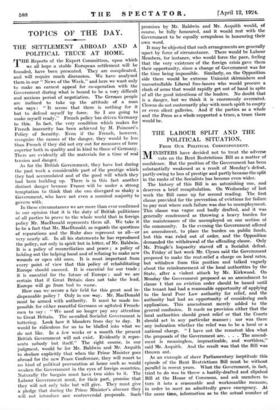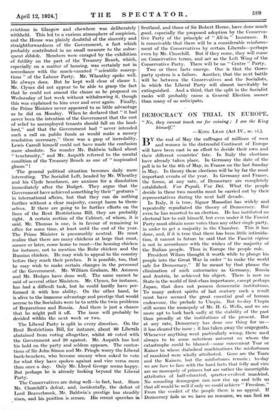THE LABOUR SPLIT AND THE POLITICAL SITUATION.
FROM OUR POLITICAL CORRESPONDENT.
MINISTERS have decided not to treat the adverse vote on the Rent Restrictions Bill as a matter of confidence. But the position of the Government has been substantially weakened as a result of Monday's defeat, partly owing to loss of prestige and partly because the split in the ranks of the Socialists has become even wider.
The history of this Bill is an astonishing one, and deserves a brief recapitulation. On Wednesday of last week the Bill came up for second reading. The first clause provided for the prevention of evictions for failure to pay rent where such failure was due to unemployment. This clause was vague and badly drafted, and it was generally condemned as throwing a heavy burden for the maintenance of the unemployed on one section of the community. In the evening the Government offered an amendment, to place the burden on public funds, but this was ruled out of order, and the Opposition demanded the withdrawal of the offending clause. Only Mr. Pringle's loquacity staved off a Socialist defeat. On Friday of last week Mr. Clynes said the Government proposed to make the rent-relief a charge on local rates, but withdrew from this position and talked vaguely about the reimbursement of the local authorities by the State, after a violent attack by Mr. Kirkwood. On Monday the Government proposed as an amendment to clause 1 that no eviction order should be issued until the tenant had had a reasonable opportunity of applying to the local Poor Law authority for relief, and the authority had had an opportunity of considering such application. This amendment merely added to the general confusion. It made no provision either that the local authorities should grant relief or that the Courts should act in any particular manner ; nor was there any indication whether the relief was to be a local or a national charge. " I have not the remotest idea what the proposals of the Government are. . . . The amend- ment is meaningless, impracticable, and worthless," said Mr. Asquith. And the result was that the Bill was thrown out.
As an example of sheer Parliamentary ineptitude this episode of the Rent Restrictions Bill must be without parallel in recent years. What the Government, in fact, tried to do was to throw a hastily-drafted and slipshod Bill at the House of Commons, and ask members to turn it into a reasonable and workmanlike measure, in order to meet an admittedly grave emergency. At the same time, information as to the actual number of evictions in Glasgive and _ elsewhere was deliberately withheld. This led to a 'curious atmosphere of suspicion, and the House was plainly doubtful of the sincerity and straightforwardness . of the Government, a fact which probably contributed in no small measure to the subse- quent &beide. Members were enraged by the exhibition of futility on the part of the Treasury Bench, which, especially on a matter of housing, was certainly not in accordance with the much-vaunted " scientific concep- tions " of the Labour Party. Mr. Wheatley spoke well. He always does. But he kept well clear of clause 1.
Mr. Clynes did not appear to be able to grasp the fact that he could not amend the clause as he proposed on Wednesday of last week without withdrawing it, though this was explained to him over and over again. Finally, the Prime Minister never appeared to so little advantage as he did on Monday. When he declared that " it had never been the intention of the Government that the cost of relief to unemployed tenants should fall on the land- lord," and that the Government had " never intended such a call on public funds as would make a money resolution necessary," there was a gasp of incredulity. Lewis Carroll himself could not have Made the confusion more absolute. No wonder Mr. Baldwin talked about " tenebrosity," and Mr. Asquith referred to the mental condition of the Treasury Bench as one of " inspissated gloom " - The general political situation becomes daily more interesting. The Socialist Left, headed by Mr. Wheatley and his Clyde henchmen, are anxious for a dissolution immediately after the Budget. They argue that the Government have achieved something by their " gestures " in international affairs, but that they can do nothing further without a clear majority, except harm to them- selves. If there are going to be further efforts on the lines of the Rent Restrictions Bill, they are probably right. A certain section of the Cabinet, of whom, it is said, Mr. Thomas is one, is in favour of remaining in office for some time, at least until the end of the year. The Prime Minister is presumably neutral. ' He must realize that there are many chickens at large that must, sooner or later, come hothe to roost—the housing chicken for instance; not to mention the Ruhr chicken and the Russian chicken. He may wish to appeal to the country before they reach their perches. It is possible, too, that he may wish to make certain changes in the personnel of the Government. Mr. William Graham, Mr. Ammon and Mr. Hodges have done well. The same cannot be said of several other. Ministers. Mr. Clynes, for instance, has had a difficult task, but he could hardly have per- formed it with less ability. On' the other hand, he is alive to the immense advantage and prestige that would accrue to the Socialists were he to settle the twin problems of Reparations and Russia. And there is just a chance that he might pull it off. The issue will probably be decided within the next week or two. - The Liberal Party is split in every direction. On the Rent Restrictions Bill, for instance, about 80 Liberals abstained from voting altogether, whilst 40 voted with the Government and 20 against. Mr. Asquith has lost his hold on the party and seldom appears. The contor- tions of Sir John Simon and Mr. Pringle worry the Liberal back-benchers, who become uneasy when asked to vote for what they have spoken against and vice versa more than once a day. Only Mr: Lloyd George seems happy. But perhaps he is already looking beyond the Liberal Party.
The Conservatives are doing well—in fact, best. Since Mr. Churchill's. defeat, and, incidentally, the defeat of Lord Beaverbrook, .Mr. Bald.wires . prestige has steadily. risen, and his pokition is secure. His recent speeches in Scotland, and those of Sir Robert Horne, have done much good, especially the proposed adoption by the Conserva- tive Party of the principle of " All-in " Insurance. It is conceivable that there will be a considerable reinforce- ment of the Conservatives by certain Liberals—perhaps even by Mr. Churchill. But if they come, they will come on Conservative terms, and act as the Left Wing of the Conservative Party. There will be no " Centre " Party.
Two or three facts emerge. One is that the three- party system is a failure. Another; that the next battle will be between the Conservatives and the Socialists, in which the Liberal Party will almost inevitably be extinguished. And a third, that the split in the Socialist ranks will probably cause a General Election sooner than many of us anticipate.











































 Previous page
Previous page